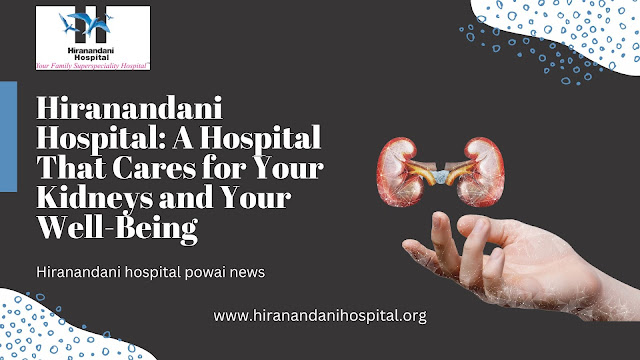Understanding Chronic Kidney Disease: Causes, Stages, and Management
Chronic Kidney Disease (CKD) is a progressive and long-term condition that affects the functioning of the kidneys. It is a serious health issue that can have significant implications for an individual's overall health and well-being. In this article, we will delve into the causes, stages, and management of chronic kidney disease, shedding light on this important topic.
Causes of Chronic Kidney Disease:
Chronic kidney disease can arise from various underlying
conditions and risk factors. Some of the common causes include:
Diabetes: Diabetes is one of the leading causes of
CKD says doctors of Hiranandani
hospital kidney transplant. High blood sugar levels can damage the
blood vessels in the kidneys, impairing their ability to filter waste and
fluids effectively.
High Blood Pressure: Uncontrolled hypertension can
strain the blood vessels in the kidneys, leading to their gradual deterioration
over time.
Glomerulonephritis: Glomerulonephritis refers to
inflammation in the tiny filters of the kidneys called glomeruli. This
condition can be a result of infections, immune system disorders, or certain
medications.
Polycystic Kidney Disease (PKD): PKD is an inherited
condition characterized by the growth of numerous cysts in the kidneys. These
cysts can gradually replace healthy kidney tissue, impairing their function.
Other Factors: Other factors that can contribute to
the development of CKD include recurrent kidney infections, urinary tract
obstructions, kidney stones, prolonged use of certain medications (e.g.,
nonsteroidal anti-inflammatory drugs), and certain autoimmune diseases.
Stages of Chronic Kidney Disease:
Chronic kidney disease is typically classified into five
stages based on the glomerular filtration rate (GFR), which measures the
kidneys' ability to filter waste products from the blood. The stages are as
follows:
Stage 1: In this early stage, the kidneys have mild
damage, and the GFR is normal or only slightly reduced. There may be no
noticeable symptoms, and the disease can often go undetected at this point.
Stage 2: The kidneys show mild to moderate damage,
and the GFR is slightly lower than normal. Some individuals may experience mild
symptoms like fatigue, increased urination, or foamy urine.
Stage 3: At this stage, the kidneys exhibit moderate
to severe damage, and the GFR is significantly reduced. Symptoms such as
swelling (edema), increased blood pressure, and changes in urination patterns
may become more pronounced.
Stage 4: The kidneys have severe damage, and the GFR
is significantly diminished. Individuals may experience symptoms like persistent
swelling, fatigue, nausea, shortness of breath, and anemia.
Stage 5: Also known as end-stage renal disease
(ESRD), this is the final stage of CKD. The kidneys have lost almost all their
functioning, and dialysis or kidney transplantation is necessary for survival.
Management of Chronic Kidney Disease:
While chronic kidney disease is a progressive condition,
early detection, and proper management can help slow down its progression and
improve quality of life. Here are some key aspects of CKD management:
Medications: Depending on the underlying cause and stage
of CKD, medications may be prescribed to manage symptoms, control blood
pressure, lower cholesterol levels, and treat complications like anemia and
bone disease.
Diet and Fluid Management: Following a healthy and
balanced diet is crucial for individuals with CKD. This usually involves
limiting salt, potassium, phosphorus, and protein intake. Fluid intake may also
need to be regulated based on individual circumstances.
Lifestyle Modifications: Adopting a healthy lifestyle
can have a significant impact on CKD management. This includes regular
exercise, maintaining a healthy weight, quitting smoking, limiting alcohol
consumption, and managing stress.
Blood Pressure Control: Since high blood pressure is
a common risk factor and complication of CKD, it is essential to keep blood
pressure under control. Medications, dietary changes, and lifestyle
modifications can help achieve and maintain optimal blood pressure levels.
Diabetes Management: If diabetes is the underlying
cause of CKD, it is crucial to manage blood sugar levels effectively. This
often involves a combination of medication, a healthy diet, regular exercise,
and regular monitoring of blood glucose levels.
Regular Monitoring: Individuals with CKD should have
regular check-ups with their healthcare provider to monitor kidney function,
blood pressure, blood tests, and overall health. These regular assessments can
help detect any changes or complications early on.
Dialysis and Transplantation: In end-stage renal
disease (stage 5 CKD), when kidney function is severely impaired, dialysis or
kidney transplantation becomes necessary. Dialysis helps filter waste and
excess fluid from the blood, while kidney transplantation offers a more
permanent solution by replacing the failed kidneys with a healthy donor kidney.
Emotional Support: Dealing with a chronic condition
like CKD can take a toll on an individual's emotional well-being. It is
essential to seek emotional support from healthcare professionals, support
groups, or loved ones to cope with the challenges and maintain a positive
mindset.
Conclusion:
Chronic Kidney Disease is a significant health concern that
requires careful management and attention. Understanding the causes, stages,
and management strategies is crucial for individuals diagnosed with CKD says, Dr.
Sujit Chatterjee CEO Hiranandani Hospital. Early detection, lifestyle
modifications, medication, and regular monitoring play a vital role in slowing
down the progression of the disease and improving quality of life. By taking
proactive steps, individuals with CKD can effectively manage their condition
and lead fulfilling lives. Remember, consulting with a healthcare professional
is essential for personalized guidance and treatment plans tailored to
individual needs.


Comments
Post a Comment